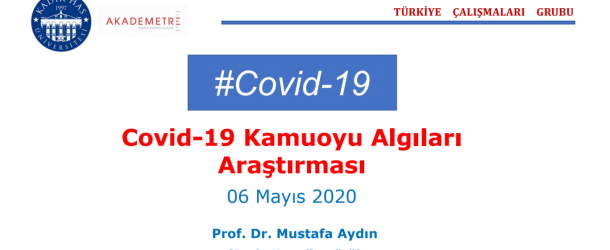Introduction
Turkish Studies Group (Türkiye Çalışmaları Grubu) from Istanbul based Kadir Has University conducted a new scientific research about Turkish people’s perceptions of the coronavirus disease.[1] The findings of the research were published as a report on May 6, 2020. Due to its political implications, this research deserves to be analyzed carefully.
Researchers and Methodology
The coordinator of the project is Professor Mustafa Aydın, a well-known Turkish scholar of International Relations. The other members of the project are Kadir Has University staff including Professor Mitat Çelikpala, Professor Sinem Akgül Açıkmeşe, Associate Professor Aslı Çarkoğlu, famous journalist Soli Özel, and Sabri Deniz Tığlı. The aim of the research was to understand and interpret Turkish people’s perceptions about the coronavirus disease. The field research for the study was conducted between April 3 and April 17, 2020 in 26 different Turkish cities. According to the methodology adopted by the researchers, 1,000 people over 18 years were interviewed face-to-face or through computer. Error margin of the study was declared as 3 %.
Findings
The first and one of the most important political findings of the research is that 41.3 % of Turkish people interpret coronavirus disease as the consequence of Chinese people’s food and nutrition habit. Whether this claim is scientifically correct or not, it shows that prejudices against Chinese people continue to exist in Turkish society despite developing economic relations in recent years and Turkish people are strongly affected from U.S. President Donald Trump’s accusations towards China as well as recent political problems between Uyghur Turks (Uyghurs) and the Chinese State. 18.4 % of Turkish people on the other hand view the coronavirus disease as a biological attack. In addition, 10.1 % of Turkish people think that the coronavirus is the natural consequence of the disappearance between human life and wild life.
The second important finding of the research reveal that most of the Turkish people are either anxious (40.9 %) or very anxious (32.4 %) about the coronavirus disease, which shows that the government’s performance in handling the issue might be a strong political factor in the next Presidential and parliamentary election. Interestingly, Turkish women seem more anxious compared to Turkish men according to study.
The third interesting finding is that 47.6 % of Turkish people think that they have fifty-fifty chance to get sick due to contagion. Another 20.6 % people think there are high risks to get sick whereas 9.7 % people claim that there are very high risks. This shows that return to ordinary economic and social life will not be easy; it will be gradual and it will take a long time to reach full-capacity production and social interaction.
The fourth finding is about personal precautions to fight against the coronavirus. The findings show that Turkish people take the coronavirus very seriously and almost all of them obey to the advices of the Coronavirus Scientific Advisory Board (Koronavirüs Bilim Kurulu). Hand-washing with soap (96 %), staying at home maximum as possible (95.4 %), not shaking hands (93.1 %), keeping the social distance (92.9 %), using mask (92 %), using cologne (91.8 %), and using disinfectant (90.5 %) are most popular measures adopted by Turkish people. Using gloves on the other hand is not a very popular precautionary mechanism with only 19.2 % people doing it.
The fifth and maybe the most important political finding of the research is about Turkish government’s success in handling the issue. 30.3 % of Turkish people find Turkish government successful in terms of dealing with the disease in addition to another 9.6 % people who consider the government as “very successful”. This shows that the AK Parti government keeps its 40 % strong electoral base but this might not be enough for winning the next Presidential election. 29.5 % of Turkish people consider Turkish government “neither successful, nor unsuccessful” whereas 18.4 % of people find it “unsuccessful” and 12.2 % of people think “very unsuccessful”. Interestingly, Turkish women’s support to government is higher compared to men.
The sixth finding is about a complementary question on whether the governmental precautions are enough or not. 29.6 % of people think that measures taken by the government are enough in addition to 10.5 % of people who think it’s highly proficient. This proves the earlier question’s findings and shows that the government has 40 % solid support at the moment.
The seventh question is about the type of precautions taken by the government and whether people support them or not. According to research’s findings, suspending schools and universities temporarily is the most popular measure taken by the government with 89.5 % support. The other popular precautions are: banning over 65 age people to go out in the street (88.5 %), suspending sports matches (88.4 %), putting people coming from other countries into quarantine (88.1 %), closing down restaurants, cafes, and other stores temporarily (88 %), suspending public prayers in mosques (87.6 %), implementing quarantine measures in some parts of cities or some cities (87.5 %), closing down all stores except pharmacies and markets (85.7 %), and nation-wide ban on going out into the street (84.6 %).
Conclusion
The findings of this research prove that Turkish people are not religious fanatics (support given to suspending public prayers is a proof for this) and they do take health issues very seriously. In addition, China’s image in Turkey is not very good due to cultural differences and nationalist arguments (situation of Uyghurs). In addition, Turkish government still has considerable support and President Recep Tayyip Erdoğan has high chance to get reelected if he could manage this crisis successfully and fix economic problems until the next election. Since perceptions do matter in democracies as well as non-democracies, all political parties should take this study very seriously.
Assoc. Prof. Dr. Ozan ÖRMECİ
[1] The research can be read from here; http://www.mustafaaydin.gen.tr/source/Covid19%20KamuoyuAlg%C4%B1lar%C4%B1_6May202011.pdf.

























































